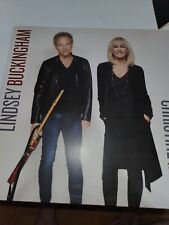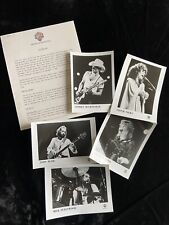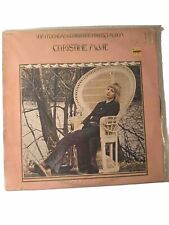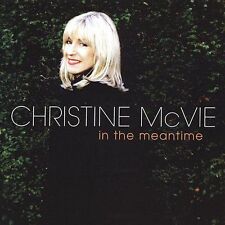|
Fleetwood Mac outgrows trials of youth
Rocky Mountain News
October 29, 1997
By Ed Masley They may be enjoying the fruits of reunion nostalgia for now, but it's doubtful that Fleetwood Mac would care to revisit the chart- topping days of their youth. It had its advantages, sure, but Rumours, the album that made the band a soft-rock institution, with worldwide sales now approaching the 27 million mark, had been fueled by the breakup of two warring couples who stayed in the Mac for the music but used the recording of Rumours to send each other signals.
Original bassist John McVie and his songwriting wife Christine were divorced in 1976 in the wake of the band's commercial breakthrough, Fleetwood Mac, an album that went on to sell more than 5 million copies. It also gave what once was a blues-rock band its first taste of Top 40 action - Over My Head, Rhiannon and Say You Love Me. Within a year, Stevie Nicks and Lindsey Buckingham, the band's romantically linked new songwriting force, were struggling through a breakup all their own. At one point, drummer Mick Fleetwood did his part to add to the tension by having a fling with Nicks. It got to the point where you had John McVie playing bass on You Make Loving Fun, a song his ex-wife had written about her latest flame, the lighting director.
In retrospect, of course, the turmoil only added to the timeless appeal of Rumours, offsetting the perfectly crafted mainstream pop of Buckingham, Nicks and McVie with a darker emotional edge. You can hear it in Buckingham pleading with Nicks on the desperate Go Your Own Way and a sultry young Nicks sniping back with the bitter yet heartbreaking Dreams. If the 31 weeks the estranged lovers spent at the top of the charts with Rumours seemed like a bad vacation, it only got worse after the two-record epic album Tusk - Buckingham's answer to the Beach Boys' ambitious Pet Sounds - failed to live up to the unrealistic commercial expectations set by Rumours.
Recorded, in part, at Dodger Stadium with - what else? - Southern Cal's Trojan Marching Band, Tusk reportedly cost $1 million to make. Forsaking the pop sensibilities that had made the Mac a household name in favor of Buckingham's willful eccentricities, it peaked at a none-too shabby No. 4, but apparently that was a sad enough showing to sour the band on ambition. As Buckingham recalls, ``The whole idea was to not make Rumours II, to make a left turn and maybe confound people's expectations, to not put ourselves on that kind of a treadmill. When that album didn't sell the kind of numbers Rumours sold, there was a kind of a backlash in the band. They'd say, `Well we're not gonna do that anymore.' So really, from the early '80s on, I was kind of treading water a little bit, not really knowing why I was doing what I was doing, not really knowing what I was supposed to be doing, after making an instinctive move.''
It's worth noting, perhaps, that Rumours II is the name Buckingham used at the time to dismiss Mirage, the far less experimental effort that reinstated the band at the top of the chart in '82. But even as the Mac regained its commercial standing, the situation within the group continued to deteriorate, fueled by the breakups, Buckingham's growing frustrations, the solo success of Nicks and increasing drug dependency among the members. ``A very difficult project'' is how the guitarist describes the 1987 album Tango in the Night, the band's best-selling effort since Rumours.``Out of about a year of work,'' he says, ``I think we saw Stevie for about three weeks
He bowed out as the band was planning a Tango tour, followed in 1990 by Nicks and Christine McVie. ``I felt like I had played out my hand at that point,'' he says, ``that the karma was OK for me to leave, and I had been sort of waiting, maybe, to do that for a while, because I just felt it wasn't a very creative situation anymore. It was difficult to get things done. And I needed to take a break just for me as well.'' He'd tried to cope through solo projects, beginning with Law and Order in 1981.But it wasn't until Buckingham had severed all ties with the band that he felt his vision returning. ``When I left,'' he says, ``I think what happened is I was able to regroup, I was able to kind of reinvent. And even though I only did one solo album - almost two - during that time, I think I really needed to step back and rejuvenate the idea of having ideals and the idea of having visions to try to fulfill. ... There was a kind of a slow eroding of ideals and a slow eroding of confidence. And all of that has come back.''
Though all five members had banded together to celebrate President Clinton's love of the '70s at his first inaugural ball, it was Buckingham' s solo career that actually brought them back together. ``I had done some work with the band I had taken on the road and wasn't too happy with the drum performances of that,'' he says. ``So yeah, I got together with Mick and we did some stuff.''
When it came time to do the bass tracks, Fleetwood suggested his longstanding partner-in-crime, John McVie, and soon enough Christine McVie was involved as well. ``So the four of us ended up in the studio one day, and it was just a weird kind of deja vu thing,'' he says. At what point did Buckingham say, ``What the heck, let's get Stevie in here?'' He pauses. ``Well ... I never said that,'' he says, with a laugh. It was mostly the label's idea, having witnessed the highly successful returns of the Eagles and Kiss.
``I think a lightbulb went off for them over there,'' he says. ``And, I think, for Mick a little bit, too, because even though he was working on my album and was very much into it, he was also ... well, that' s kind of his life's blood, you know? I think he was kind of working on it behind the scenes. I was not, certainly, campaigning for the idea.'' I mean, I'm not finished with my album. ... And the idea of putting something down after you've worked on it for a couple years - and it's probably the best thing you've ever done - it's not an easy thing to turn around in your head.'' It took a call from the chairman of Warner Bros. to sell him on the idea. ``I said to him, `I know you haven't heard my album, but if you had it in your hand and you felt that it was a stone-cold smash hit, would your advice to me still be that this is a good thing for me to do.' He said, `Absolutely.' I said, `Well, OK.' ''
The band's chart-topping reunion album, The Dance, was recorded live while taping an MTV broadcast. In addition to all the hits from Rumours, it features two new Buckingham tunes as well as Tusk. The old songs fell right into place. And the new ones? Buckingham chuckles and clears his throat. ``I sort of have to go back to the studio versions,'' he says. ``I had a version of My Little Demon that really didn't involve the band that I had done at my house, more like a Tusk approach, and that, you know, we didn't get close to that. I didn't expect to really, because it was much, much weirder, the version I had. So you just have to, especially for a live situation, be philosophical about how much you can expect to approach what you hear in your head.'' Now that the lineup behind what remains the third-biggest-selling rock album ever is out on the road again, Buckingham says, ``I think the important thing now is that we have come back together and there is a sense of a reconvening and a sense of enjoying this whole thing without all the baggage that was there maybe 10 years ago.'' So would the old band be more open to taking a musical chance at this point? ``I don't think taking more of a chance has come up, particularly, in this situation,'' he says. ``Down the road, if we were ever to do, say, a studio album, which'' - he pauses to clear his throat - ``I don't know if that will happen or not. ``I think we're taking everything one step at a time. But if that were to happen, that idea would probably be put to the test a little more.''
|






![Christine McVie - Christine Mcvie [New CD] picture](/vintage/img/g/91YAAOSwjSVlQ5Xu/s-l225/Christine-McVie-Christine-Mcvie-New-CD-.jpg)


